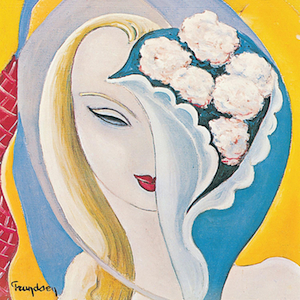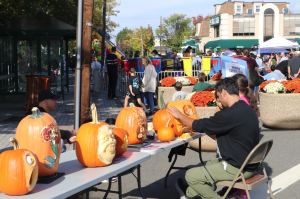50 Years of Layla and Other Assorted Love Songs

October 29, 2020
November 9th will mark the 50th anniversary of the only studio album released by Derek and the Dominos, Layla and Other Assorted Love Songs. Derek and the Dominos was best known for being the band Eric Clapton joined following brief stints with Cream and Blind Faith, two renowned rock supergroups. The other members of the band were Bobby Whitlock (keyboard), Carl Radle (bass), and Jim Gordon (drums). The four members had previously played together in Delaney & Bonnie & Friends, an ensemble soul group. During this time, Clapton was undergoing a personal crisis, as he had fallen in love with Pattie Boyd, the wife of the famous Beatle George Harrison. The lyrics of this remarkable album display this situation, as themes throughout the 76-minute, 44-second run time include heartbreak, agony, and frustration. This album, considered a rock-blues crossover, was carried by Clapton’s established guitar playing, along with the brilliant songwriting ability of Whitlock. A special guest who contributed to the album immensely was Duane Allman, an incredibly underrated slide guitar player who unfortunately passed away at the age of 24 in a motorcycle crash less than one year after the release of Layla and Other Assorted Love Songs. Through the vocals on almost all the records, you can hear Clapton’s angst and youthfulness (he was 24-25 during time of recording.)
The album opens up with “I Looked Away,” which sets the mood for the rest of the album with its anguished tone and sorrowful guitar. Despite its relatively short runtime compared to the rest of the album, “I Looked Away,” fits an incredible amount of musicality into that short period. The song opens with an optimistic guitar intro before Clapton’s vocals, drenched in torment, comes in and describes the pain he feels from his unrequited love. The line “I’m such a lonely man” repeated in the choruses also shows Clapton’s state of mind at this time. The second verse takes this emotion up a notch, and the third verse, sung by Whitlock, brings a different sound but the same feel. The song ends with the chorus repeated and a fading guitar coda.
Following “I Looked Away” is “Bell Bottom Blues,” arguably the saddest song on the entire album. The title comes from a time Clapton asked Boyd if he could buy her anything, to which she asked him to buy her bell-bottom blue jeans, a popular form of attire in the 60s and 70s. This song is packed to the brim with somberness and desperation for 5 whole minutes, and the repeated phrase “I don’t wanna fade away, give me one more day please” sets the song’s distressed tone. In addition, the guitar tone on this song is unbelievably poignant, and the rhythm section really stands out in this song. Clapton’s dramatic tone in the first two songs is somewhat stifled in the next track, “Keep on Growing”, an upbeat blues tune that displays Clapton’s guitar prowess for all to see, and rides off of a catchy refrain and melody line. The next number is “Nobody Knows When You’re Down and Out”, a cover originally performed by blues musician Jimmy Cox. We once again hear Clapton’s sorrowful singing, and the lyrics are incredibly well-fitting to his circumstance at the time, as they describe a man who has hit rock bottom.
The somber feel of “Nobody Knows When You’re Down and Out” carries on to the fifth track, “I Am Yours.” This song has a more acoustic feel compared to the rest of the album and is not as overtly loud and packed with raw emotion as the previous tracks. Personally, the next two tracks (“Anyday” and “Key to The Highway”) can be clumped together under the overarching category of consistent blues numbers. I wouldn’t call these two songs “fillers;” rather, I think of them as recordings of a jam session and musicians just soaking in the music. These two records are loud and guitar-heavy, which I personally can only appreciate when in a certain mood. Blues can tend to be very mood-oriented, and with that said, I would probably not be able to listen to 7-minute blues songs on a daily basis. However, they both have highlights that make them unique in their own right, as “Anyday” has an incredibly catchy melody and “Key to the Highway” has an upbeat tempo and feel that allows the listener to lose themselves in the music for the lengthy nine-minute duration. In “Tell The Truth,” which follows these two songs, I greatly appreciate the harmony and tonal contrast between Clapton and Whitlock’s voices. The vibe is similar to “Keep On Growing” in its laid-back and feel-driven style.
The ninth track is one of the most upbeat and fast-paced tunes on the whole album, “Why Does Love Have to Be So Sad.” The song opens with a dramatic and suspenseful instrumental before exploding into pure guitar virtuosity from Clapton. In four minutes and 41 seconds, he manages to pour his entire heart and soul into every note he plays and sings. The repeated refrain “Why does love have to be so sad?” once again pushes the theme of heartbreak to the forefront of this album. To me, the guitar solo around the halfway mark is one of Clapton’s career bests, as he mixes speed with feel in a way that makes his guitar wail and exude pain and angst. The soft guitar ending that closes this record is echoed in “Layla,” which I will get to later.
The tenth track of the album, “Have You Ever Loved a Woman”, is arguably my favorite track from the entire album. Although I had just said I would usually not listen to seven-minute blues songs all the way through, this song is the only exception. Every time I listen to it, it is nearly impossible to skip it. The song, which is a Freddie King cover, contains lyrics that are remarkably similar to Clapton’s circumstances. They revolve around a man who is in love with a woman, but cannot be with her because she is already with another man. The startling similarity between lyric and reality must have pushed Clapton to another gear, as he holds nothing back, whether it be his voice or guitar. The song opens with a roaring guitar intro, before Clapton sings two pain-filled verses that sound as if he is about to break down into absolute despair. After this, it enters a three and a half minute “guitar battle” between Clapton and Duane Allman, the aforementioned slide guitarist. Allman rips off a beautiful solo to start, and Clapton comes in with a guitar exuding passion around the four-minute mark and proceeds to launch his own powerful blues solo. Blues emphasizes raw emotion over pure technicality, and the sound of both guitarists spilling their souls into their respective guitars feels like watching a fireworks show, where each guitarist is trying to outmatch the other. The song ends with another verse, and after the last note, the song leaves you feeling refreshed, like you just went out for a relaxing jog through the neighborhood of music.
The following track is another cover, this time of Jimi Hendrix’s song “Little Wing.” “Little Wing” is considered to be one of Hendrix’s greatest songs, despite its short run time of under two minutes and 30 seconds. The Derek and the Dominos version is a tribute towards the late musician who had passed away a few months prior. Clapton was good friends with Hendrix, and the song choice is fitting, as the line “fly on, little wing” resonates at a deeper level. The song is incredibly uplifting yet melancholy, and I believe it is a solid tribute that did justice to Hendrix. The succeeding track “It’s Too Late” is another blues number that returns to the theme of longing and heartache that is omnipresent throughout the entire album. It is a decent song, but not much more than a sentimental blues ballad to my ears.
The penultimate track could have an article of its own because of how iconic and amazing it is, yet I will try to explain its mastery in a couple sentences. The track I am referring to is “Layla”; considered to be Clapton’s magnum opus. The name Layla comes from an ancient Arabic poem about a man named Manjun who falls in love with a girl named Layla, but cannot be with her because of her father’s disapproval. “Layla” opens with a jolting riff that is instantly recognizable and simply cool and classy. After this iconic riff, Clapton’s voice, at its most vulnerable, rings out. At this point, Clapton is begging and pleading with the woman he is infatuated with. His lyrics embody a sense of desperation and blind love that is so relatable and invoking of empathy that is impossible to listen to without feeling anguish yourself. After three heart-aching verses with a chorus following each, a piano coda with a slide guitar solo from Allman comes in. This is one of the most beautiful moments in all of music, and I envision a state of respite in the middle of a quiet forest during this section, with the piano playing the ethereal melody and Allman making his slide guitar cry. These combined factors make this passage a perfect ending to an already brilliant song. The last song on this album is “Thorn Tree In the Garden”, which fits perfectly with the end passage of Layla. After an intro that makes use of harmonics, the song is reminiscent of “It’s Too Late” with its longing tone. Whitlock’s haunting falsetto while singing the word “somewhere” near the end adds a genuine sense of desperation and grief as well. In an album that undergoes a whirlwind of emotions, it is a sublime choice to end an eventful album with a soft song containing a tone of acceptance.
To truly understand the meaning behind “Layla and Other Assorted Love Songs”, you must first understand the context. Granted, Clapton was head over heels in love with Harrison’s wife, but it was deeper than that. He was truly lost in his life and this album demonstrates his confusion and loss of direction on a larger scale. This album resonates with me not because of Clapton’s broken-heartedness, but because of the honesty and heart he pushes into every song. When I listen to this album, I hear a man giving his all and describing himself and his life in ways words could never explain. I’m not gonna place a score on this album, because I think listening to it yourself and being your own judge is the better way to judge music and formulate and develop opinion and taste. I hope you give this album a listen and find that my descriptions are not crazy overstatements or hyperboles, but perspectives that contain a foundation of truth.
Link to the album (Spotify):
https://open.spotify.com/album/5iIWnMgvSM8uEBwXKsPcXM?si=9m8wwKAcTIuitr9R1DtTbg
Link to the album (YouTube)
https://www.youtube.com/playlist?list=OLAK5uy_m58MHKZnUxrt1L5fy_pE4qoMAgVphWSdQ

















































































































































